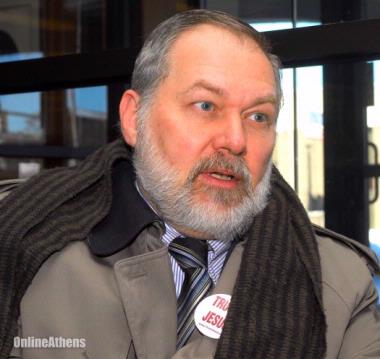Scott Lively, best known to many as the promoter of an extreme Ugandan law against homosexuality, is now channeling his energies into state politics. Lively, whose base of operations is Holy Grounds—a church in Springfield that “looks like a coffee house”—is running as an independent in the Massachusetts governor’s race. That race could pit the newcomer to state electoral politics against well-credentialed opponents like Attorney General Martha Coakley or former federal Department of Homeland Security official Juliette Khayyam on the Democratic side and former state Secretary of Administration and Finance Charlie Baker from the GOP, among others.
Lively’s mission statement is succinct and pulls no punches. “Massachusetts is the bluest of the blue states,” it says, “the first to adopt socialized medicine and ‘gay marriage,’ the national model for promoting homosexuality to children in the public schools, and the most aggressive defender of child-killing through abortion. The Mass. Republican Party is solidly controlled by moderate to liberal ‘progressives’ and the Democrats are virtual communists. They both embrace and champion the culture of death. With these two liberal parties splitting the liberal vote, a true conservative independent could win the governorship.”
It’s not hard to understand where Lively wants Massachusetts to be philosophically, especially if you’re familiar with his anti-gay campaigns in the U.S., Russia, East Europe and Africa. One of the world’s most conspicuous anti-gay activists, Lively boasts that his contacts in the Soviet Union have led to recent crackdowns on homosexuality there that have surrounded the Winter Olympics at Sochi with controversy.
And because of Lively, last year a suit filed under the Alien Torts Act, which allows foreigners to sue American nationals for violating American or international law, was allowed to go forward in U.S. District Court in Springfield. Judge Michael Ponsor gave the green light to a suit against Lively by a Ugandan organization, Sexual Minorities Uganda, charging that the homophobia Lively promulgated when he attended a conference in Kampala in 2009 has led to worsening abuse of gay people in Uganda.
(Lively has said that he did not support the death penalty provision that was added to a Ugandan law against homosexuality developed partly because of his efforts; a version of that law that substitutes life imprisonment for the death penalty passed in Uganda a few days before Christmas.)
But a bid for the governorship needs more than ideology and the attribution of global evil to one source, the Marxist-gay axis. It demands realpolitik, programs, connection with constituent demands. In a telephone interview, the Advocate asked Lively if he has concrete plans for the state—a plan for managing its economy, for example.
“I think we need less government and a more efficient structure of government agencies,” Lively said. “I think we have duplication all through the social services. I think we should lower taxes and focus on one of the key points that I have been campaigning on, which is to defund things I believe are harmful to society, such as homosexuality and abortion, take those funds and provide microfinancing and business startup funding for inner city families to end dependency. That’s been very effective in Africa. It’s been very positive for people in poverty situations. I’d like to try it in cities like Springfield that have a large number of people that are dependent on government.”
And how would he deal with the commonwealth’s burgeoning problem of homelessness? “I think that we need to change the focus in state government from a Marxist-based approach to a Christian one,” said Lively. “The poor have always been among us, yet somehow everyone was taken care of better before we had this welfare state.” Lively’s own church serves what he describes as “almost a gourmet meal” for the homeless every Saturday afternoon.
In spite of his reflexive use of the term “Marxist,” Lively sees common ground between the left and some on the right, including himself, in their shared disapproval of “predatory corporatists,” whose rise, he says, represents “another aspect of the decline of Christian thinking. Big pharma, agribiz instead of family farms, banksters—everything is profit. Profit before people. You need to change worldview and that will have a very positive effect right out of the gate.”
Whatever you think of Scott Lively, his remarks about “predatory corporatists” reveal parts of his own worldview that don’t fit in with the platforms of the oligarchical layer of the extreme right. If they did, the idea that he could pull out a win for the corner office might be more realistic. As it is, he acknowledges on his website, “…it would take a miracle from God for Scott Lively to become governor of Massachusetts—and I wouldn’t want it any other way… So don’t expect me to campaign like a politician. I will do nothing more than travel the state to offer what I believe are Biblical solutions to Massachusetts’ problems—and leave the rest to Almighty God. May He heal this Commonwealth.”•



